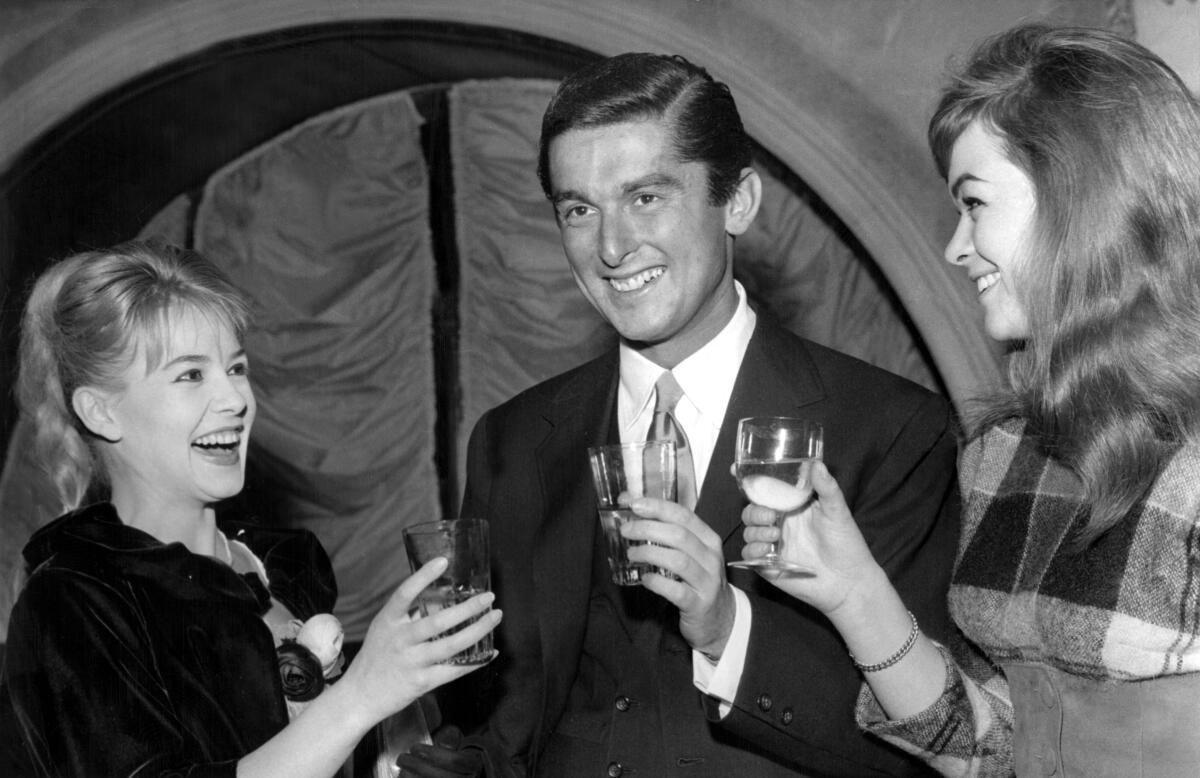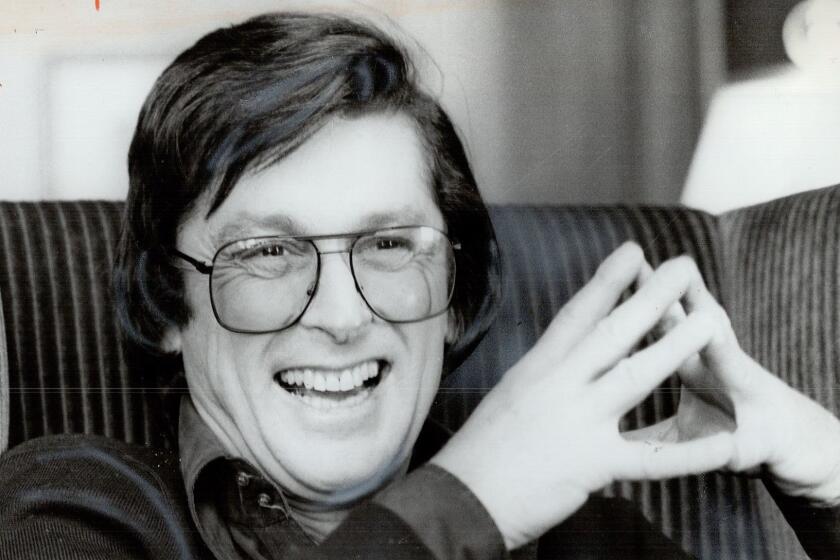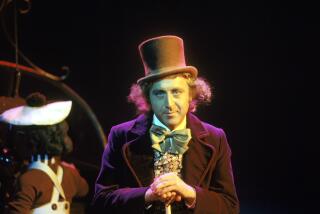Director Brett Morgen on Robert Evans’ legacy and the ‘#MeToo moment’ that never was

Documentarian Brett Morgen knew Robert Evans, the producing legend who died Saturday at age 89, for about 20 years. Yet, when people came to him with their memories of Evans, Morgen found them hard to reconcile with those of his “best friend.”
“I would always recognize an element of Bob in that story,” Morgen said Monday from his offices in Culver City. “But it always felt very, at the same time, foreign to me.”
Morgen lived with and studied Evans as the cowriter of the acclaimed 2002 documentary “The Kid Stays in the Picture,” based on the bestselling memoir from — and narrated by — the industry icon. They later reunited for “Kid Notorious,” an animated series based on Evans’ life. On Monday, Morgen wrote a touching tribute to the movie mogul on Twitter, paired with nostalgic photos of a young Evans in his poolside element.
“Bob Evans produced some of the greatest films of all time, but the greatest production of all, was his life,” the director wrote. “When you were with Bob, there was nowhere else on Earth you’d rather be. He was funnier, sweeter and more charming than the character he created.”
Morgen got to know the larger-than-life character that was Evans on an intimate level beyond his many successes and scandals. Throughout his multi-layered career, the rare actor-turned-producer was known for saving Paramount Pictures with now-classic hits like “Rosemary’s Baby,” “Chinatown” and Francis Ford Coppola’s “The Godfather.”
He also made a name for himself outside the studio as a charismatic socialite with a playboy reputation, marrying and divorcing seven times — in addition to his other high-profile flings. Described by some as self-destructive, Evans courted controversy, whether in the form of feuds with Coppola, a cocaine habit or link to the murder of theatrical promoter Roy Radin, who had entered an agreement with Evans while he sought funding for 1984’s “The Cotton Club.” Evans was never charged with any involvement in the crime.
As the chief of Paramount Pictures, Robert Evans presided over a remarkable run of film classics including “Chinatown” and “The Godfather.”
But Morgen knew a different side of Evans — an empathetic listener who was unique to everyone he met and who made sure everyone he met felt unique. Morgan reflects on Evans’ complicated legacy, what his death means for Hollywood and how his ladies’ man rep holds up in the #MeToo era. (The copy has been edited for clarity and brevity)
When you heard the news of Evans’ death, what went through your mind?
It felt like a tremble in the force, to use a “Star Wars” metaphor. The world will never be the same again. Bob has come to represent an image of Hollywood that for better or worse has been dominant for the past 70 years. Bob has a direct link to the very beginning of cinema, and he carried that history with him to today.
He wasn’t just a part of the golden era of Hollywood in the ’70s. He is as instrumental for that period as anyone in this town. Right now, the filmmakers and the films we will be celebrating throughout this award season and the filmmakers that are now heralded culturally. If you ask them for their favorite movies and movies that inspired them to be filmmakers, you’ll find a long list of Robert Evans creations or produced vehicles — that the current crop of auteurs are really descendants of Bob’s role in this town and the impact he had on this industry.
People have dismissed Robert and his impact because he has a reputation for being a bit self-aggrandizing or perhaps being the hero of his own narrative. And that’s caused many people to think that he has exaggerated his contributions. And that’s why, when I saw Francis Coppola’s tribute to Bob today, it was so moving, because, of course, Francis has gone well out of his way to acknowledge Bob’s contributions to arguably the greatest movie ever made: “The Godfather.” A lot of people dismiss Bob as a kind of caricature and someone who took more credit than he deserved. And listen, Bob contributed to that. But as someone who’s not only lived with him but studied him, I can tell you. I bore witness to his great sense of narrative, his tremendous storytelling prowess, his unique ability to put the right talent together on a package. It’s just something you either have or you don’t.
So who was the real Evans?
Bob was the best friend I’ve ever had, and what makes a great friend? Someone who, when you’re with that person, there is nowhere else you would rather be on this Earth. Someone who feels your pain, who shares your pain, who shares your joys and your triumphs. Bob, for all of his self-aggrandizing, had an ability to empathize that was greater than anyone I have ever known. Now, empathy with Bob was not an absolute, meaning there are millions of people who will surface to say, “Bob Evans, the most empathic character in this town? Are you kidding me?” And that’s fine. They have their own story of Bob.
I would watch journalists come into Bob’s room, thinking that they were there to get this story and then they would sit down, and Bob would just start asking them about themselves. I’ve only met one other icon who had that ability — it was Tom Cruise — to make you feel so special. It was a gift. It was part of his seduction, but it was also real.
Speaking of “his seduction,” how would you reevaluate Evans’ womanizing reputation in the #MeToo era?
For the last couple of years, Bob and I had talked about adapting “The Kid Stays in the Picture” into a TV series, and I was very well aware of the challenges of trying to present that particular story from that particular era in this moment in time. I also was well aware of the fact that I think most people in Hollywood were probably waiting for Bob to have his #MeToo moment. And it never happened.
My experience with Bob when he was around women was he listened to them in a way that most men don’t. That’s maybe why there isn’t a #MeToo moment for Bob. I think everybody in this industry thinks there’s going to be, but there isn’t. There may be — I don’t know. I’m simply telling you what I experienced. ... Who did Bob have running his production company, Christine Peters? Bob understood women better than most men I know.
As a Hollywood pioneer, what do you think Evans would have thought of the Marvel-versus-cinema debate?
We can look to history to answer that. Bob was making “Marathon Man” while he was actively pursuing the rights for “Popeye.” As “Superman” took off, he wanted to get into the comic book universe and in fact made what I believe is one of the greatest comic book adaptations. If you think of the 1970s equivalent of blockbusters, Bob would have been happy to have been a part of any of them.
What would Evans want to be remembered most for?
I know Bob was immensely proud of the work he did at Paramount ... I think he would say that his biggest contribution was keeping Paramount alive. And when we were doing “The Kid Stays in the Picture,” Bob ... did not want me to include any mention of cocaine or the “Cotton Club” murder. And he said, “You know, I didn’t mention them in the book on tape, and the book on tape was wildly successful.” And I said, “Bob, that may be true. But the thing is, your transgressions are actually a feather in your cap. It’s actually what has created your legend, and without them, you’re a producer without a story.”
In many ways, Bob threw himself into these crazy situations and lived as full a life as anyone over the past 90 years ... going from the women’s [clothing] business to being an actor to running a studio to greenlighting the greatest movies ever made to watching an incredibly successful producing deal to being a pariah, and then coming back as a legend. I mean, an extraordinary life.
More to Read
Only good movies
Get the Indie Focus newsletter, Mark Olsen's weekly guide to the world of cinema.
You may occasionally receive promotional content from the Los Angeles Times.








